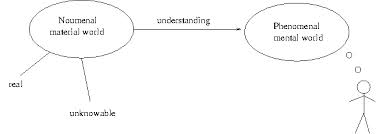
There is a branch of yoga called dream yoga which is concerned with spiritual awakening. It can be found at the intersection of lucid dreaming and Buddhism. Most people associate yoga with asana practice but there is none of that in this form of yoga; instead it is more meditative and focused on awareness.
Dream yoga has an interesting philosophical perspective. According to Padmasambhava, eight-century Indian adept, “all phenomena are nonexistent, but they appear to exist and are established as various things.” Phenomena, as defined by Immanuel Kant, are the realities or appearances that are interpreted from our minds, which is in contrast to noumena which are the things that exist regardless of our mind’s interpretations.
Kant claims that we only have the ability to know the world that is presented to us from our minds and that the external world can never truly be known. In other words, the only knowledge that we know, and ever will know, is knowledge of phenomena. This means that knowledge of noumena is, and always will be, unknown, thus rendering the discussion of metaphysics pointless (but I still find it very interesting).
Phenomena parallels conventional reality and noumena parallels absolute reality. There is that which one believes to be real (conventional/relative reality), and that which is absolutely real (absolute reality). There are multiple conventional realities because everyone has different beliefs but there is only one absolute reality. Not to say that these realities are exclusive of one another; there can be much overlap.
When Padmasambhava says, “all phenomena are nonexistent, but they appear to exist and are established as various things” he means that our waking lives are just as delusional and no more real than our dreams. For example, objects are perceived by the mind and then interpreted by the mind. Thus, objects can become doubly distorted by the mind. How can one know whether the perception is valid? Or if the interpretation is valid? This also forms a feedback loop. An interpretation of an object invokes a perception that further reinforces the interpretation and so on. This limits thinking and causes ‘mental ruts.’ This relates to the expression: change the way you look at things and the things you look at will change. While we cannot know what is absolutely real we can change what we think is real.
Apart from objects, when it comes to people we invariably decontextualize – placing absolute labels where no absolutes exist. It’s like that line from the movie The Breakfast Club: “You see us as you want to see us... in the simplest terms and the most convenient definitions. You see us as a brain, an athlete, a basket case, a princess, and a criminal.” This is why first impressions are so important. Based on a brief interaction you get an idea of who a person is but who’s to say that that impression is accurate or enduring? Impressions are taken out of context; you don’t know what conditions have led a person to act as they do or if they always act in a certain way. Forgiveness and openness is needed for understanding people.
While all phenomena are not real that does not mean they do not matter. For example, a child may be afraid of a monster in the closet. The monster is not real but that does not mean that it does not matter; it matters immensely to that frightened child. So then what does matter if all phenomena are non-existent? Well, what matters is relevant. If something matters then it matters, if it does not matter then it does not matter; you get to choose. Also, what matters to you may not matter to other people, and vice versa.
In conclusion, dream yoga gets you to become aware of mind-dependence; rather than focusing on the external world you reflect inward to understand why you see things the way you do and to see through these illusions created by the mind.
 Holidays
Holidays  Girl's Behavior
Girl's Behavior  Guy's Behavior
Guy's Behavior  Flirting
Flirting  Dating
Dating  Relationships
Relationships  Fashion & Beauty
Fashion & Beauty  Health & Fitness
Health & Fitness  Marriage & Weddings
Marriage & Weddings  Shopping & Gifts
Shopping & Gifts  Technology & Internet
Technology & Internet  Break Up & Divorce
Break Up & Divorce  Education & Career
Education & Career  Entertainment & Arts
Entertainment & Arts  Family & Friends
Family & Friends  Food & Beverage
Food & Beverage  Hobbies & Leisure
Hobbies & Leisure  Other
Other  Religion & Spirituality
Religion & Spirituality  Society & Politics
Society & Politics  Sports
Sports  Travel
Travel  Trending & News
Trending & News
What Girls & Guys Said
Opinion
0Opinion
Interesting Take, thank you for sharing! I've never tried this. Also, the image you used is quite beautiful.
Thanks. Actually, I didn't put that image there. One of the editors or moderators must have done that, lol. I like it though
Oh I see. That's alright, still an interesting Take!